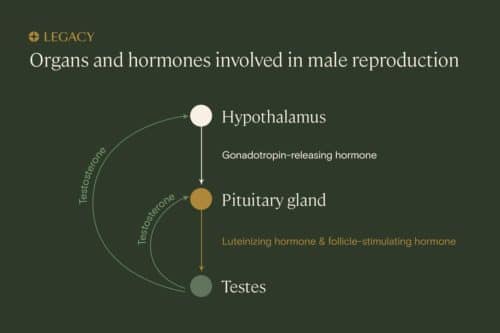Infertility affects one in seven heterosexual couples, and male-factor infertility contributes in half of all cases. In many cases, people with infertility don’t have a reason to suspect that they may have fertility issues until they start trying to conceive. Instead, symptoms of male infertility are usually related to underlying conditions that are also the root cause of infertility.
Generally, infertility is diagnosed after one year of trying to conceive without success, and further testing is necessary to understand the root cause of infertility. So while the only true symptom of infertility is the inability to conceive a child, there are a few early warning signs you may want to keep an eye on. Here, we cover six symptoms of male infertility to be aware of.
Key takeaways:
- The warning signs and symptoms of male infertility tend to be related to the root cause of infertility, rather than the diagnosis of infertility.
- Most people only realize they may have infertility when they begin trying to conceive and struggle. However, there are a few warning signs associated with potential root causes of infertility to keep in mind.
- The best way to get an understanding of your fertility is to begin with a semen analysis test, which can be done at a clinic or from the comfort of home.

Low testosterone or hormone imbalance
Testosterone is one of the key hormones that drive male fertility. Testosterone is responsible for the creation and growth of male sex organs and is necessary for some aspects of spermatogenesis (the process of creating sperm).
There are other key hormones that drive the process of sperm production, like follicle-stimulating hormone and luteinizing hormone. An imbalance in any of these reproductive hormones can negatively impact sperm production.
A few common symptoms of hormone imbalance include: hair loss, weight gain or loss, low sex drive, erectile dysfunction, and fatigue. If you’re experiencing any of these, you may want to talk to your doctor about male fertility hormone testing.
Erectile or ejaculatory dysfunction
Erectile dysfunction is the inability to achieve or maintain an erection. Studies show that poor semen quality is associated with erectile dysfunction, depending on the severity of the condition and what’s causing both issues.
One study shows that erectile dysfunction and premature ejaculation have a prevalence of one in six infertile men. Researchers note that sometimes the psychological concerns associated with infertility can underlie sexual dysfunction.
However, sexual dysfunction is related to many conditions, and doesn’t always indicate infertility. Other causes for erectile dysfunction may be obesity, heart disease, stress, high blood pressure, Parkinson’s disease, or multiple sclerosis. If you’re experiencing erectile dysfunction, it’s important to discuss this with a doctor to get to the root cause of it. While it’s not necessarily always a symptom of male infertility, the inability to maintain an erection can make it harder to conceive naturally.
Ejaculatory dysfunction can take different forms, including premature ejaculations, retrograde ejaculation (or “dry orgasm”), and delayed ejaculation. Whichever form it takes, ejaculatory dysfunction can prevent sperm from effectively reaching the female reproductive system, and can negatively impact fertility. For example, in a case of retrograde ejaculation, semen travels back into the bladder instead of out through the penis. Although it’s painless and harmless, this means that sperm cannot reach the ovum (female egg).

Pain or swelling in the genitals
If you experience pain or swelling in the testicles or penis, that could signal a number of conditions known to affect male fertility.
It could be related to a blockage in the urethra (the tube that carries semen from the testicles) or in the epididymis (a duct that passes sperm from the testes to the vas deferens). For example, a sexually transmitted infection (STI) like chlamydia or gonorrhea can cause inflammation of the urethra or epididymis, causing painful ejaculation and affecting fertility.
It could also indicate poor blood flow that can negatively impact sperm production and sperm quality parameters, such as a varicocele. A varicocele is an enlarged vein within the scrotum that causes blood to pool. This can cause oxidative stress, increased heat, and reduced blood flow, which all have a negative impact on sperm quality.
Delayed puberty
Delayed puberty is a symptom that can be attributed to a number of causes, many of which may impact a person’s fertility.
For example, delayed puberty can be a sign of a growth hormone deficiency. Research shows that growth hormone-deficient people are more likely to have low sperm count or azoospermia, where no sperm is found in the semen. A scientific review also shows that growth hormone deficiency can negatively impact the male reproductive system and spermatogenesis, the body’s process of creating sperm.
Delayed puberty can also be a sign of Kallmann syndrome, a rare genetic condition that affects 1 out of 30,000 males and is known to negatively impact fertility. Kallmann syndrome causes a lack of hormones that are important in driving sexual reproductive development. Delayed puberty is often what alerts doctors, and most people with Kallmann syndrome go undiagnosed until they reach their adolescent years.
Inability to smell
Along with delayed puberty, the inability to smell is another trademark sign of Kallmann syndrome. Since Kallman syndrome causes impaired sexual development, most people with this condition will experience poor or even absent sperm production.
Cystic fibrosis
Cystic fibrosis (CF) is another genetic condition that impacts fertility. Nearly 98% of men with CF experience infertility due to a congenital absence of the vas deferens, which is the tube that connects the epididymis (where sperm is stored) to the ejaculatory duct.
However, 90% of people with CF have healthy sperm production, which means that reproductive assistance procedures like testicular sperm extraction (TESE) can make conceiving biological children possible.
Test your fertility early on
Remember, if you experience a sign such as sudden weight gain, that doesn’t necessarily mean that you have a testosterone issue in particular or even a fertility issue. It’s important to communicate sudden changes in health with your primary care physician to ensure good general health.
If you are thinking of starting a family, are actively trying to conceive, or simply want to plan for the future, getting a semen analysis is a great baseline test to see how your fertility checks out.
Getting started has never been easier with at-home semen analysis kits. Take a look at our sperm testing guide to learn about your options and understand how the process works.



